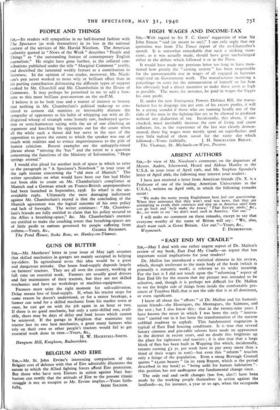Slit,—Its readers will sympathise in no half-hearted fashion with The
Spectator (as with themselves) in its loss in the national interest of the services of Mr. Harold Nicolson. The American authority quoted in " News of the Week " describes " People and Things" as "the outstanding feature of contemporary English journalism." He might have gone further, as the collated con- tributions published under the title " Marginal Comment " testify, and described the lamented weekly feature as a contribution to literature. In the opinion of one reader, moreover, Mr. Nicol- son's pen never worked to more wily or brilliant effect than in his parting contribution delineating the different types of support evoked by Mr. Churchill and Mr. Chamberlain in the House of Commons. It may perhaps be permitted to me to add a foot- note to this most brilliant post-mortem on the ex-P.M.
I believe it to be both true and a matter of interest to history that nothing in Mr. Chamberlain's political make-up so con- trived to cement old enmities or irrevocably alienate the sympathy of .opponents as his habit of whipping out with an ill- disguised whoop of triumph some homely saw, hackneyed quota- tion or semi-humorous saying with the air of one clinching an argument and knocking his opponents out for the count when all the while such a thrust did but serve in the eyes of the opposition to prove the extent to which the speaker was out of touch with realities and to evince imperviousness to the pith of honest criticism. Recent examples are the unhappily-timed phrase about " missing the 'bus " and the retort to a question concerning the functions of the Ministry of Information, " Hope springs eternal."
I would also plead for another inch of space in which to refer to the paragraph in " A Spectator's Notebook " in your issue of the 24th instant concerning the " old men of Munich." The writer speculates on what would have been our fate had Hitler not been able to count on Mr. Chamberlain's compliance at Munich and a German attack on Francci-British unpreparedness had been launched in September, 1938. So what? is the un- avoidable reply. Ultimately the most damaging indictment against Mr. Chamberlain's record is that the concluding of the Munich agreement was the logical outcome of his own policy and lack of foresight. The writer continues : " Mr. Chamber- lain's friends are fully entitled to claim that his policY secured to the Allies a breathing-space," &c. Mr. Chamberlain's enemies are entitled to make the crushing retort that breathing-spaces are of little profit to nations governed by people suffering from






























 Previous page
Previous page